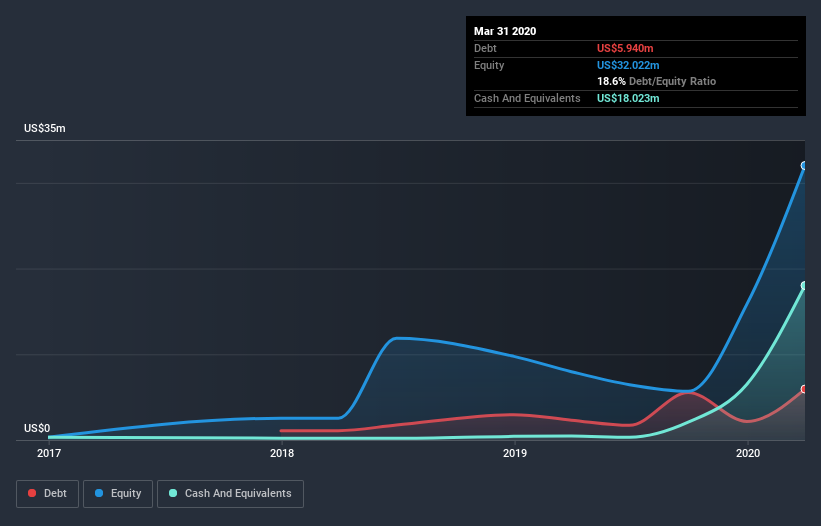Is LMP Automotive Holdings (NASDAQ:LMPX) Weighed On By Its Debt Load?

Legendary fund manager Li Lu (who Charlie Munger backed) once said, 'The biggest investment risk is not the volatility of prices, but whether you will suffer a permanent loss of capital.' So it might be obvious that you need to consider debt, when you think about how risky any given stock is, because too much debt can sink a company. Importantly, LMP Automotive Holdings, Inc. (NASDAQ:LMPX) does carry debt. But is this debt a concern to shareholders?
When Is Debt A Problem?
Debt assists a business until the business has trouble paying it off, either with new capital or with free cash flow. Ultimately, if the company can't fulfill its legal obligations to repay debt, shareholders could walk away with nothing. While that is not too common, we often do see indebted companies permanently diluting shareholders because lenders force them to raise capital at a distressed price. Having said that, the most common situation is where a company manages its debt reasonably well - and to its own advantage. The first thing to do when considering how much debt a business uses is to look at its cash and debt together.
See our latest analysis for LMP Automotive Holdings
How Much Debt Does LMP Automotive Holdings Carry?
As you can see below, at the end of March 2020, LMP Automotive Holdings had US$5.94m of debt, up from US$2.32m a year ago. Click the image for more detail. However, its balance sheet shows it holds US$18.0m in cash, so it actually has US$12.1m net cash.
How Healthy Is LMP Automotive Holdings's Balance Sheet?
The latest balance sheet data shows that LMP Automotive Holdings had liabilities of US$6.54m due within a year, and liabilities of US$1.39m falling due after that. Offsetting these obligations, it had cash of US$18.0m as well as receivables valued at US$4.59m due within 12 months. So it actually has US$14.7m more liquid assets than total liabilities.
This excess liquidity suggests that LMP Automotive Holdings is taking a careful approach to debt. Due to its strong net asset position, it is not likely to face issues with its lenders. Succinctly put, LMP Automotive Holdings boasts net cash, so it's fair to say it does not have a heavy debt load! There's no doubt that we learn most about debt from the balance sheet. But it is future earnings, more than anything, that will determine LMP Automotive Holdings's ability to maintain a healthy balance sheet going forward. So if you want to see what the professionals think, you might find this free report on analyst profit forecasts to be interesting.
In the last year LMP Automotive Holdings had negative earnings before interest and tax, and actually shrunk its revenue by 41%, to US$11m. That makes us nervous, to say the least.
So How Risky Is LMP Automotive Holdings?
By their very nature companies that are losing money are more risky than those with a long history of profitability. And the fact is that over the last twelve months LMP Automotive Holdings lost money at the earnings before interest and tax (EBIT) line. Indeed, in that time it burnt through US$10.9m of cash and made a loss of US$4.3m. But at least it has US$12.1m on the balance sheet to spend on growth, near-term. Overall, its balance sheet doesn't seem overly risky, at the moment, but we're always cautious until we see the positive free cash flow. When analysing debt levels, the balance sheet is the obvious place to start. However, not all investment risk resides within the balance sheet - far from it. Consider for instance, the ever-present spectre of investment risk. We've identified 3 warning signs with LMP Automotive Holdings (at least 1 which can't be ignored) , and understanding them should be part of your investment process.
At the end of the day, it's often better to focus on companies that are free from net debt. You can access our special list of such companies (all with a track record of profit growth). It's free.
This article by Simply Wall St is general in nature. It does not constitute a recommendation to buy or sell any stock, and does not take account of your objectives, or your financial situation. We aim to bring you long-term focused analysis driven by fundamental data. Note that our analysis may not factor in the latest price-sensitive company announcements or qualitative material. Simply Wall St has no position in any stocks mentioned.
Have feedback on this article? Concerned about the content? Get in touch with us directly. Alternatively, email editorial-team@simplywallst.com.

